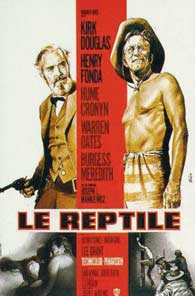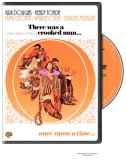| Reviews & Columns |
|
Reviews DVD TV on DVD Blu-ray 4K UHD International DVDs In Theaters Reviews by Studio Video Games Features Collector Series DVDs Easter Egg Database Interviews DVD Talk Radio Feature Articles Columns Anime Talk DVD Savant Horror DVDs The M.O.D. Squad Art House HD Talk Silent DVD
|
DVD Talk Forum |
|
|
| Resources |
|
DVD Price Search Customer Service #'s RCE Info Links |
|
Columns
|
|
|
''There was a crooked man...''
Soon after stealing $500,000 and squirreling it away in a den of rattlesnakes, Paris Pitman Jr. (Kirk Douglas) is arrested after his victim (Arthur O'Connell) spots him at the local whorehouse. He's taken to the Arizona Territorial Prison, a fortress 50 miles from nowhere, joining six cellmates: naive thug Floyd (Warren Oates); hulking Chinese Ah-Ping (Olympic athlete C.K. Yang); Dudley Whinner (Hume Cronyn) and Cyrus McNutt (John Randolph), gay lovers and con artists convicted of fraud; Coy Cavendish (Michael Blodgett), a condemned young man who accidentally killed the father of his promiscuous girlfriend; and The Missouri Kid (Burgess Meredith), an old inmate resigned to spending the rest of his life in jail.
When the Warden and various prisoners learn that Pitman has hidden his half-million somewhere nearby, they alternately try to woo and beat the information out of him, while the articulate Pitman methodically wins over his fellow inmates with an eye on using them when he's ready to make his break. After the warden is killed, Woodward W. Lopeman (Henry Fonda), a progressive lawman who wants to improve conditions at the penitentiary and rehabilitate his men, takes his place. The film's focus is Lopeman's efforts to mold Pitman into a model prisoner, and Pitman's manipulation of Lopeman.
Kirk Douglas had effectively played heel-heroes in the past, notably in Billy Wilder's brilliant Ace in the Hole (1951), but "There was a crooked man..." plays curiously off-balance throughout. Maybe audiences weren't suppose to realize until the climax what an unscrupulous bastard Pitman is, or that Lopeman ultimately is the far more sympathetic character, but whatever the case the film ambles along for more than two hours without ever giving its audience an opportunity to latch onto either leading character.
(Spoilers Ahead) Though it repeats Bonnie and Clyde's basic structure, insofar as predominately comical characters and situations eventually turn bleak and violent, the abrupt change of "There was a crooked man..."'s direction into cynical tragedy, though surprising, doesn't work because it lacks the air of dread that hangs over Bonnie and Clyde almost from the beginning, and because three-fourths of the picture plays like (newfound permissiveness aside) an ordinary Western comedy. It would be like having North to Alaska conclude with John Wayne blowing away Ernie Kovacs, or a bloodbath at the end of Support Your Local Sheriff.
In trying to be hip, the film at times resembles a bad Otto Preminger movie, with throwaway efforts like Meredith's grizzled character's habit of growing his own marihuana. The script's idea of frank sexuality also takes on curious forms. Did audiences really need that shot of an aging hooker's (soap icon Jeanne Cooper) flabby body? Or the superfluous lusting by one of the prison guards toward Blodgett's character, in a film already sporting two middle-aged homosexuals? (The guard is played by stocky Bert Freed; to say that he's cast against type would be an understatement.)
That said, Cronyn and Randolph are among the film's assets, quite delightful as constantly bickering lovers Dudley and Cyrus. Randolph, always reliable, avoids sexual stereotypes wisely playing his role as pretty much he would any other, while Cronyn adopts a subtle femininity in his mannerisms clearly based on those of his actress wife, Jessica Tandy.
Fonda, too, is good in an ill-defined role. Played with quiet assurance, it's almost like his Wyatt Earp from My Darling Clementine 20 years later. The script shortchanges what might have been a fascinating character however, and it's as unappealing watching Douglas's character taking advantage of him as it is watching Douglas be a real S.O.B. near the end, when his actions directly cause the death of characters we've come to like.
Besides Meredith and Randolph, similarly blacklisted actress Lee Grant (who debuted in Detective Story, also with Douglas) gets co-starring billing, appearing in a thankless part near the end, as a woman Pitman beds down with before he unceremoniously departs the next morning. One guesses that additional footage featuring her was probably scripted and perhaps shot but trimmed to bring down the film's running time.
Overall, the picture's efforts to be contemporary and relevant, or something, play forced and don't really work. The overscored, pop-ish soundtrack (by Charles Strouse) and title design emulate Butch Cassidy and the Sundance Kid while other elements, such as Harry Stradling Jr.'s traditional cinematography, suggests a more conventional comic Western. That Douglas was 54 and Fonda was 65 by the time this was released likewise fail to conjure up images of Robert Redford and Paul Newman.
Video & Audio
"There was a crooked man..." is presented in its original Panavision frame format of about 2.35:1 in a strong 16:9 enhanced presentation with good color (original prints by Technicolor) and clean mono sound. An alternate French mono track is included, along with optional English subtitles, but nothing in French and Spanish (Warner Home Video may be cutting back in this department.)
Extra Features
Modest extras include a vintage featurette, On Location with 'There Was a Crooked Man...' that's full frame and runs 10 minutes. The show focuses on relative newcomer Blodgett's experiences on location, learning the ropes from genre veterans like Warren Oates. There's a lot of good footage of Mankiewicz and his crew, giving the viewer a good sense of what the production of the film was like.
Also included is an original theatrical trailer, a prime example of how not to market a film like this.
Parting Thoughts
According to pal Charlie Ziarko, who graduated from DGA trainee to second assistant director when the film went over its 81-day schedule, "There was a crooked man..." had a very successful preview late in 1969 but was caught in the disarray of Warner Bros.'s transition from Seven Arts to Kinney. Better marketing might have made "There was a crooked man..." a bigger success than it was but, despite some good performances, the film remains a seriously flawed though interesting effort.
* Charlie adds that he has warm and vivid memories of Fonda's professionalism, Cronyn's friendliness, and Mankiewicz's willingness to answer his many questions about All About Eve. You can spot him holding a megaphone in the featurette.
Film historian Stuart Galbraith IV's most recent essays appear in Criterion's new three-disc Seven Samurai DVD and BCI Eclipse's The Quiet Duel.
|
| Popular Reviews |
| Sponsored Links |
|
|
| Sponsored Links |
|
|
| Release List | Reviews | Shop | Newsletter | Forum | DVD Giveaways | Blu-Ray | Advertise |
|
Copyright 2024 DVDTalk.com All Rights Reserved. Legal Info, Privacy Policy, Terms of Use,
Manage Preferences,
Your Privacy Choices | |||||||














